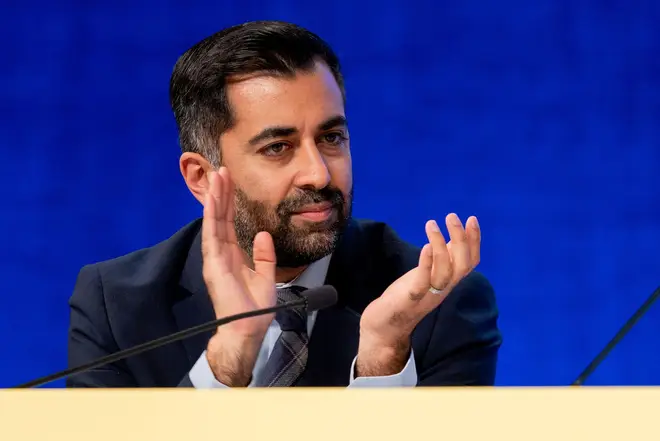
Paul Brand 3pm - 6pm
15 October 2023, 19:04

A radical shift in independence strategy has been backed by the SNP after Humza Yousaf won support for a plan which would see it demand negotiations with a new UK government if it wins a majority of seats at the next General Election.
Delegates at the SNP conference in Aberdeen agreed the strategy just days ahead of the date, October 19, which their previous leader Nicola Sturgeon had promised them would see a second independence referendum held.
That plan was kicked into touch by the Supreme Court which ruled the Scottish Parliament did not have the power to unilaterally hold a referendum without UK government agreement.
Searching for a new strategy, the SNP has now agreed that if it wins a majority of MPs in Scotland it will have a mandate to discuss steps to independence with the new Prime Minister.
However the party, rejected proposals which would have seen it needing to win the majority share of the vote, 50% plus one, to open any talks on independence.
That "defacto referendum" idea had been initially propsed by Nicola Sturgeon just before she stepped down as leader, but Mr Yousaf said it would see the party "setting ourselves a bar no other party sets itself".
As a result, the new strategy means the SNP will have to win at least 29 constituencies, 15 fewer than it currently holds. Recent opinion polls have suggested that could be difficult for the SNP with Labour now neck and neck on voting intention.
But Mr Yousaf said that by putting "on page one, in line one" of the party's manifesto that a vote for the SNP is a vote for independence there could be no doubt in voters' minds what they were choosing.
As a result, he said, if they secured a majority of MPs that would secure a mandate to speak with the UK government about giving "democratic effect" to that vote. His preferred option is to hold a second independence referendum.
It was also agreed that the party would push for the power to hold a referendum to be transferred from Westminster to Holyrood, along with a tranche of other legal powers around employment law, energy company taxation, visas for overseas workers and new borrowing powers.
The party also agreed that if there was no movement from the UK government at that point, the next Holyrood election in 2026 would be used as a defacto referendum.
The First Minister said the current "Westminster roadblock" to holding a second referendum required the SNP to "use the next general election to put independence front and centre".
He added: "Let's not fall into the trap of setting ourselves a bar no other party sets itself to win. If the Westminster parties want a test for popular support (for) the proposition of independence, let's do it via a referendum. If they give us the powers I will hold the referendum tomorrow.
"But in an election a majority of seats is a victory, plain and simple."
His comments came as he claimed that "Westminster is running scared and denying democracy".
Mr Yousaf said: "Westminster is denying Scotland a democratic referendum - that tells you precisely who fears democracy and no wonder."
He went on: "While setting our Westminster goal as winning a majority of seats....if we win that majority that will be our mandate to begin negotiations with the UK Government of how to put into democratic effect the decision of the Scottish people."
His comments came as he insisted the need for Scotland to become independent had never "been more urgent" as people struggle amid the cost-of-living crisis.
"Now is the time to inspire people to show them the better country we can build with the powers of independence," the SNP leader said.
However he stressed to his party's supporters that there "is no short cut that will get us to independence", with Mr Yousaf arguing that "listening, campaigning, persuading" were necessary.
He added: "After today's debate let us agree we come together and work like we have never worked before to deliver a better future for our country."
Proposing an amendment calling for a change to a "majority" of the vote, Mr Wishart said the approach would present a "credible and realistic route" to independence.
He also urged delegates to reject an amendment by fellow MP Tommy Sheppard which called for the party's manifesto to demand the "permanent transfer of legal powers" to hold an independence referendum.
Mr Wishart said: "By all means, vote for amendment A if you want, but all you are actually going to be doing is giving Westminster something new to say no to."
He added: "Our one job is to deliver a result which demonstrates that a majority of the people of Scotland want to become an independent nation.
"It will give us the real credibility when we approach international institutions, we will have Scotland's express consent to redesign our relationship with Westminster."
The new strategy was slammed by pro-union organisation Scotland in Union. Chief executive Pamela Nash said: “This entire debate confirmed how out-of-touch the SNP is with the people of Scotland.
“In a cost-of-living crisis, only the nationalists would spend time talking to themselves about convoluted constitutional processes. The SNP’s latest incoherent attempt to use the General Election as a proxy for separation still involves trying to use the contest as a ‘de facto referendum’, and that is an utter insult to voters.
“The next election must be about the people’s priorities; not the SNP’s.”
Scottish Conservative constitution spokesman, Donald Cameron MSP said: "The SNP will alawys put their relentless pursuit iof independence above everything else.
"Humza Yousaf and SNP are committed to wasting more taxpayers money on independence rather than addressing the real priorities of Scotland. The country can't afford five more years of the SNP's obsession."